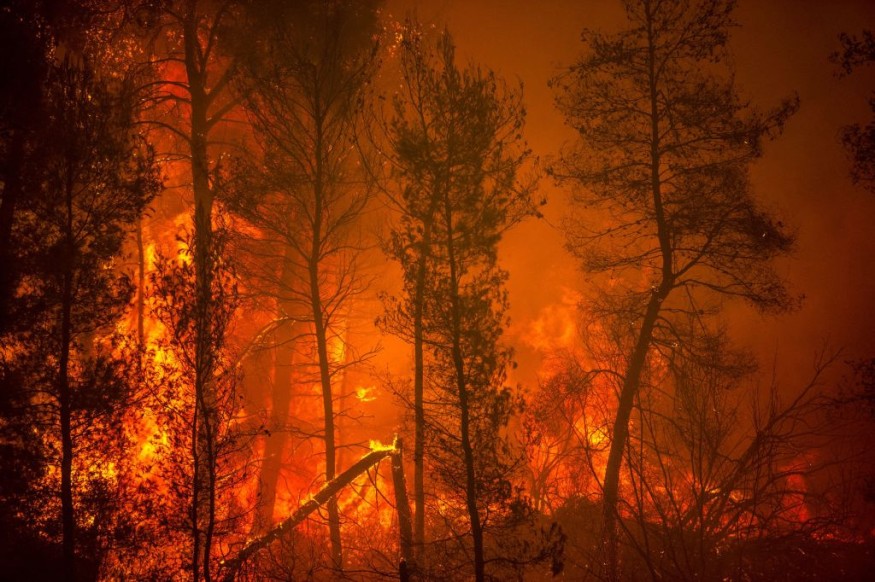As wildfires continued to rage following a record heatwave on the Greek island of Evia, hundreds of Greek islanders fled their homes, bringing their belongings with them.
As indicated in a Phys.org report, Greece and neighboring Turkey have been combating the devastating fires for almost two weeks; 10 individuals were confirmed dead, and dozens requiring treatment from the hospital.
Over the weekend, while rain resulted in some respite from the blazes in Turkey, Greece continues to experience hot and dry summer.
According to Triantatfyllos Konstantinos, a 46-year-old islander, the fires "burnt out paradise," adding, "We're done." Additionally, the fires have destroyed homes and decreased thousands of hectares of the island to ash on the second-largest island of Greece, Evia, just northeast of the capital Athens.

How Do Heatwaves Cause Wildfires?
According to the Center for Climate and Energy Solutions, extreme heat can escalate the danger of other types of disasters. More so, heat can worsen drought, and hot, dry conditions, in turn, can generate wildfire conditions.
Meanwhile, in cities, road constructions and infrastructure can be heated between 50 and 90 degrees hotter than air, while natural surfaces stay nearer air temperatures.
Essentially, the heat island impact is strongest during the day, although the slow emission of heat from the infrastructure overnight, or an atmospheric heat island, can keep cities much hotter than surrounding areas. Increasing temperatures throughout the country postures a threat to individuals, ecosystems, as well as the economy.
Wildfires in Evia Island
According to Nikos Hardalias, the Civil Protection Deputy Minister, strong winds were pushing a fire front north of Evia towards beach villages.
A similar US News report said, also according to Hardalias, there's another struggling evening ahead, another difficult night. He added, 17 aircraft helped combat the fires on Evia.
Nonetheless, fires that occurred in the southwestern Peloponnese region and a northern suburb of Athens had declined, added the official.
The rocky landscape and dense pine forests on this island that attracts tourists very much are helping in the spread of flames and make the firefighters' work nearly impossible.
How Do Heatwaves Occur?
Information posted on the WorldAtlas site specified that a heatwave is formed when the upper atmosphere has high pressure, making it motionless over a region.
This motionless mass of air can stay stagnant for many days and even weeks, trapping more heat and decreasing convection currents. Consequently, there is accrued heat and high humidity sans any rainfall.
This generates unusually high temperatures. Heatwaves are quite typical during the hot or summer season, from May until November in the northern hemisphere.
Such high pressure forces air to sink to the land's surface and acts as a barricade for heat to rise. This then covers the earth's surface and traps all elements of weather without enabling them to escape.
Impact on Energy
While higher temperatures in summer increase, electricity demand for cooling, and simultaneously, it can lower the transmission lines' ability to carry power, probably resulting in electricity dependability issues during heatwaves.
Even though warmer winters will decrease the requirement for heating, the previous modeling proposes that total energy use in the United States will rise in a hotter future.
This then can lower the thermal efficiency of power production, making it difficult for power plants to conform to the environmental regulations on cooling water.
Hundreds of Greek Islanders Fleeing
The said Phys.org report also specified, even water-bombing planes struggle, with an official announcing to local media that much of the water was evaporating even before it reached the ground.
According to the coast guard, hundreds of Greek islanders have already fled their homes on the island, and 349 more were brought early to safety Sunday.
A report on the said wildfires brought by a recent heatwave is shown on FRANCE 24 English's YouTube video below:
RELATED ARTICLE : How Many Species Are There on Earth? Experts Say Counting All Species Will Never End
Check out more news and information on Environment and Climate in Science Times.










